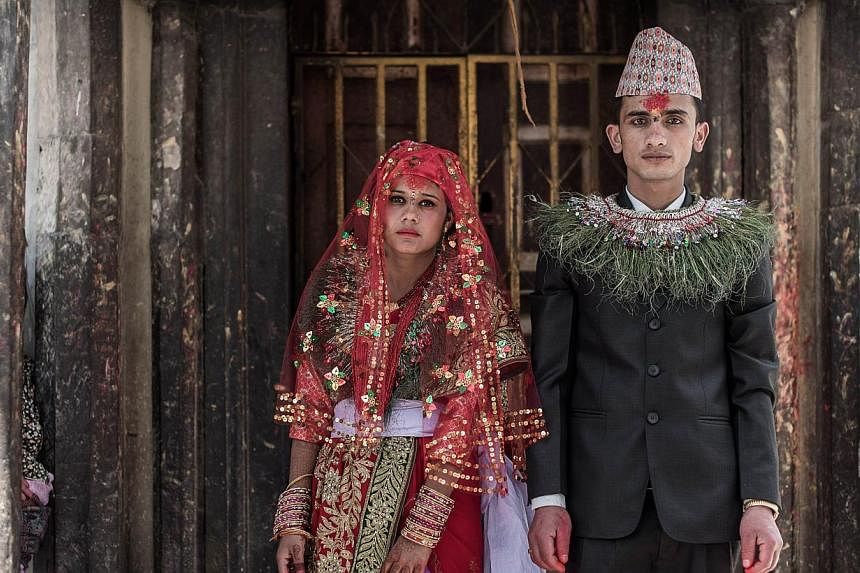THE 7.8 magnitude earthquake hit Nepal on April 25, a month regarded as the best time astrologically for Hindu weddings.
Every April, the arrival of the "wedding season" is marked by ostentation: frenzied buying, rows of cars parked outside party palaces, and the loud sound of brass bands playing Bollywood songs. But much of this was missing from post-disaster marriages, where many cultural as well as economic constraints and opportunities were noticeable.
Marriage, post-quake
HINDU marriages in Nepal are heavy on both ceremonial rituals and family gatherings. An "average" Nepali family requires a good sum of money to get its son/daughter married - that is, if the marriage is taking place with family consent.
In post-disaster marriages, the need to spend lots of money and fulfil many rituals was often suspended. From following the news, talking to relatives who attended marriage ceremonies, as well as from the weddings I personally attended after April 25, I discovered that post-disaster weddings could be categorised into three different categories: marriages that were scheduled to take place post-April 25 before the earthquake hit and went ahead as per the plan; marriages that were indefinitely postponed due to some reason (death in the family, for instance); and marriages that were fixed after the earthquake.
Wedding categories
MANY of the weddings that had been decided prior to the first quake went ahead as planned (though not in the first three days after the disaster), though they were made as simple as possible. Many relatives who would have otherwise been part of the wedding in "normal" times were absent. One of the grooms told me that they deliberately did not invite many relatives. It was believed that the relatives would understand the non-invitation - a situation which would have invited offence in "normal" times. Fewer relatives in attendance meant less money spent on food as well as the otherwise compulsory gifts.
This situation has proved particularly helpful for the bride's side. A female friend told me that only a third of the original 400 guests promised by the groom's side showed up for the wedding, though all the gifts previously promised by the bride's side had to be handed over. But there are negative sides to these marriages too - many "would-be" grooms are demanding a full set of furniture for the new post-quake homes they need to build.
The weddings that were postponed due to the calamity are an example of the opportunity the disaster has provided for those looking to economise the affair. Some people have intentionally chosen this as an appropriate time for marriage. A post-April 25 wedding that took place in my neighbourhood had originally been postponed due to the death of some relatives. If rituals had been properly followed, it would have been necessary to observe a year of mourning, during which no marriage is allowed. But seeing the chance to save money and stress, the family asked a neighbour to perform the rituals so they could marry their son quickly and easily.
But it is the marriages fixed after the quake that have the most interesting stories.
Many of the brides and the grooms in this category had not planned to marry this year itself. But seeing how easy post-quake marriage would be, they quickly put it together.
Interestingly, three of the weddings in this category that I know of were love marriages. Parents were not willing to fulfil ritual obligations in all three cases. This point would have stood out had the ceremony taken place in the pre-disaster period. But in the aftermath of the quake, in some cases, parents were convinced to allow marriages on the grounds of low costs and by the argument that most people would not pay attention to who married whom at a time of tragedy.
Revise and reconstruct
ACROSS the board, the earthquake had made fulfilling the nuptial rituals easier. For example, my cousin sister was sitting at her "jaggey" when an aftershock hit. The priest was forced both by the bride's and the groom's side to end the marriage ceremony immediately. They were declared married without all the rituals being fulfilled. Amazingly, not even a single relative gossiped about the inappropriateness of the ceremony afterward.
Another fascinating development has been the subtle challenging of caste endogamy in these marriages. In my own experience, two marriages where caste was a big problem were accepted by parents and relatives without the usual dramatic scenes. Parents were saying it was "their choice", that they did not want to make their children sad by opposing their desires.
In Nepal, weddings are not a private affair. The bride and the groom do not simply make individual choices. Marriages are more often than not about the family and its place in society. The rituals, the money, the rigid boundaries of "appropriate" class and caste considerations are a burdensome reality. But in the past month, families have found that these boundaries can be pushed and that the burden can be made lighter. But how long will this window of disregard for rituals and norms last?
Everywhere you turn, you see people thinking of the disaster as an opportunity to revise and reconstruct our prevailing political system. It is equally important to use the earthquake as an opportunity to question our social norms, to consider new ways of being "good" members of our families and communities.
THE KATHMANDU POST/ ASIA NEWS NETWORK
The writer is a researcher at GalliGalli, a not-for-profit organisation working on easing access to government services.

